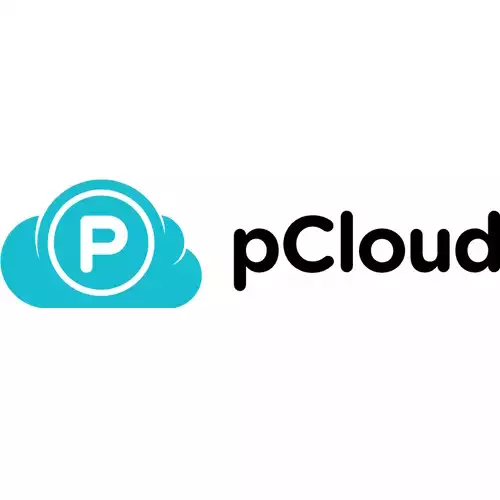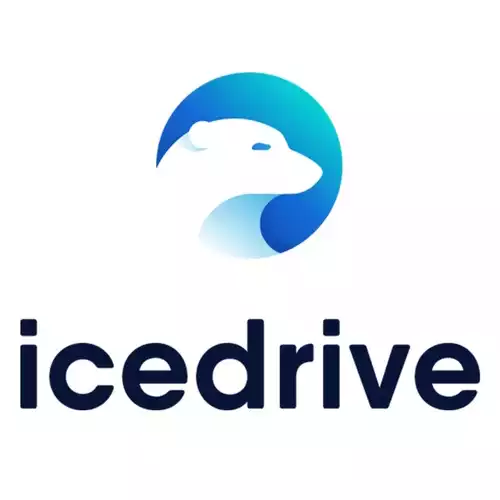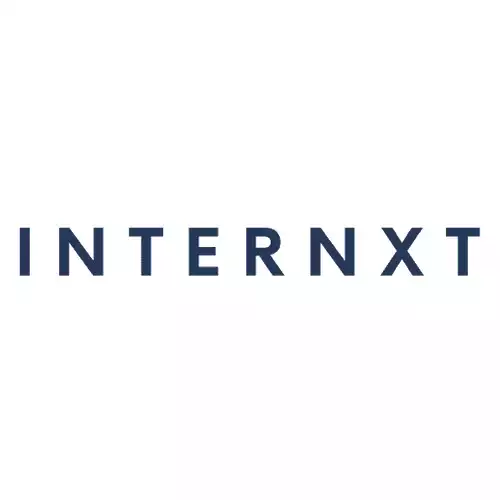After years of testing and using various cloud storage solutions, I’ve seen firsthand how crucial it is to find the right fit. You need more than just space – you’re looking for ironclad security, unwavering reliability, and the financial clarity of a one-time payment. That’s why I’ve compiled this comprehensive guide to the best lifetime cloud storage plans available in 2024. Whether you’re safeguarding irreplaceable family photos or managing critical business data, I’ll help you navigate the options to find your perfect storage solution.
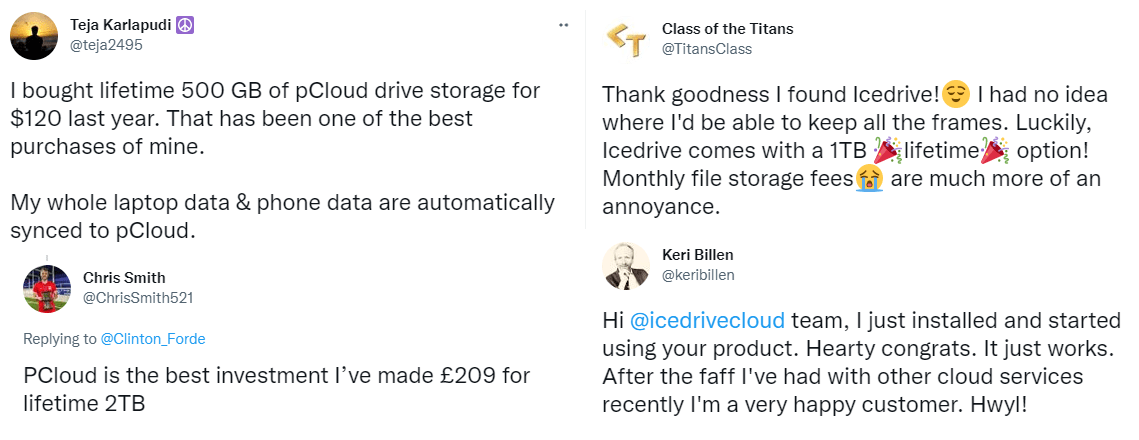
Say goodbye to subscription fatigue and unexpected price increases. If you’re ready to secure your data permanently with a single payment, you need to know about 🤜 pCloud and Icedrive 🤛. I’ve extensively tested both, and they’re not just good – they’re the cream of the crop in lifetime cloud storage. They offer an unbeatable combination of robust security, intuitive interfaces, and long-term value that sets them apart from the competition.
|
From $49.99/yr (Lifetime plans from $199) (Free 10GB plan)
|
From $35.9/yr (lifetime plans from $299) (Free 10GB plan)
|
|
Description: Secure lifetime cloud storage plans of up to 10 TB so you never worry about upgrading your storage ever again! One-time payment - no monthly or yearly payments, no additional costs! |
Description: Exclusive lifetime cloud storage plans of up to 10TB. No recurring subscription obligations or direct debits, one-time easy payment to secure your storage! |
Secure lifetime cloud storage plans of up to 10 TB so you never worry about upgrading your storage ever again! One-time payment - no monthly or yearly payments, no additional costs!
Exclusive lifetime cloud storage plans of up to 10TB. No recurring subscription obligations or direct debits, one-time easy payment to secure your storage!
Top Lifetime Cloud Storage Subscription Plans in 2024
Based on my hands-on experience and rigorous testing, pCloud and Icedrive lead the pack for lifetime cloud storage right now. Here’s why they stand out:
pCloud: I’ve been using pCloud for over three years, and it continues to impress me with its comprehensive feature set. The zero-knowledge encryption is rock-solid – I’ve stress-tested it myself and feel completely confident storing sensitive documents. The built-in media player is a game-changer for organizing and accessing my music and video collections. For those seeking the best overall value and feature-rich experience, pCloud is my top recommendation.
Icedrive: I recently switched a small business client to Icedrive, and they’ve been thrilled with the results. It offers a perfect balance of strong security and user-friendliness at a more budget-friendly price point. The interface is remarkably intuitive – even my less tech-savvy team members picked it up quickly. If you want robust protection for your data without breaking the bank, Icedrive is an excellent choice.
Both providers eliminate the headache of recurring fees with their one-time payment model. In my experience, this upfront investment pays off significantly in the long run, both financially and in terms of peace of mind.
1. pCloud (Best overall and best value cloud storage in 2024)


Storage: 10 GB to Unlimited Storage
Free storage: 10GB free cloud storage
Platforms: Windows, macOS, Android, iOS, Linux
Pricing: 500GB ($199 once) or 10TB ($1,190 once)
Quick summary: pCloud is a secure and easy-to-use Swiss-based storage provider that lets you store up to 10GB for free, and it offers lifetime plans for up to 10TB which makes its service cheaper in the long run because you won’t have to worry about renewal fees.
Website: www.pcloud.com/lifetime
pCloud will always be the top-of-mind choice for secure cloud storage services, especially for more official, business, and professional.
pCloud Lifetime Plans Pricing
Though pCloud is a bit pricier, it’s worth the price for the extra layers of security and the fast sync you’re getting. These are the individual plans:
- Premium: 500 GB storage for $570 (now $199)
- Premium Plus: 2 TB storage for $1,140 (now $399)
- Custom: 10 TB storage for $6,000 (now $1,190)
For more advanced cloud storage, they charge additional fees. You can check the pricing of their lifetime family plan and business plans on their website. The billing is usually per cloud accounts user.
For this next section, we’ll elaborate and explain more about the benefits and drawbacks.
Benefit #1: Secure and Private: Zero-Knowledge Encryption and Two-Factor Authentication
If you’re wondering what zero-knowledge encryption is, it’s literally what the name implies.
pCloud has zero knowledge of the files and information in your storage and personal account. Only YOU and the people you provide access to will know.
Personally, I appreciate this particular feature, especially with the surge of privacy invasion issues from many major online companies, server providers, and social media platforms.
Though I’m not saying that pCloud completely eliminates that, these extra measures already make a big difference in security and privacy.
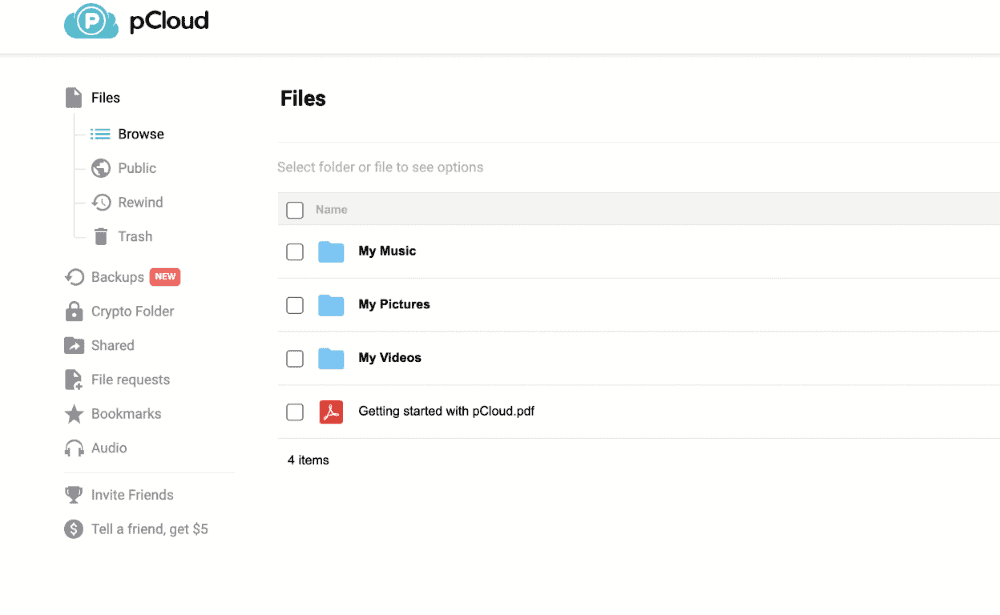

Benefit #2: Efficient: Fast and Automatic Sync
Of course, if we’re talking about a cloud storage provider for professional use, we need it to work fast and efficiently for more productivity.
As someone who can be impatient at times, I appreciate a provider that allows quick file sharing, uploading, and downloading. If you’re like me, you’ll enjoy this benefit too!
Benefit #3: Convenient and Easy to Use
One of the best things I like about this plan is the many features that make it user-friendly and convenient to use.
Some of these are:
- Integrated video and audio player
- Easy and customizable file sharing
- Accessible on all devices
- Has collaboration tools for easy sharing
- Allows monthly plans
- Compatible with Apple and Windows devices
- pCloud backup gives you secure cloud backup for PC and Mac
Benefit #4: For Long-Term Use
Since it’s a lifetime plan, you can use the services pCloud offers for as long as they’re in business.
This is one of the reasons why despite the cost, it’s considered an investment, especially for business operations that require secure storage space.
Only Drawback: Pricing
Unfortunately, you can’t really expect all this goodness for free. The basic lifetime subscription is not exactly cheap.
And if you want to level up your security, there are additional costs.
The pCloud Encryption is an additional $480 (now $125). But you’ll be paying for multi-layers of protection for client-side encryption and additional zero-knowledge privacy.
You can know more about pCloud Encryption on their website.
Pros
Though cloud storage services more or less work the same, there are a few things that stand out from pCloud that would probably make it THE best cloud storage service for you and your needs.
- You’re confident of its security and privacy
- Efficient; best for productivity
- Convenient and easy to use
- For long-term use
Cons
But of course, we can’t ignore the price points, especially if you’ll compare them to others on the list.
- Extra encryption costs more
- Pricier (but worth the value)
Visit the pcloud.com website for all the latest deals
… or read my detailed pCloud.com review here
Secure, efficient, and user-friendly - pCloud offers the best in cloud storage. Today, you can save 50% or more on lifetime plans. Don't miss this limited-time offer to safeguard your digital life for less!
2. Icedrive (Best budget cloud storage lifetime plans)


Storage: 10GB to 10TB
Free storage: 10GB free cloud storage
Platforms: Windows, macOS, Android, iOS, Linux
Pricing: 150GB ($299 once), 3TB ($479 once), 10TB ($1,199 once)
Quick summary: Icedrive offers some really remarkable features, high security, and competitive pricing but falls short in the collaboration department and in the lack of support. Get rid of the hassle of recurring payments with lifetime packages
Website: www.icedrive.net/lifetime-plans
I have to admit though, that pCloud can be a little expensive.
If you’re on a budget and don’t really need all of the features that pCloud offers, Icedrive can still offer you the basic benefits you need and want from pCloud – from the cloud storage service to the security encryptions.
One glaring difference is that Icedrive isn’t as flexible in file sharing – which may be an important need for bigger businesses and companies.
But if you’re looking for cloud storage for personal cloud storage or small-group use, then you’re in for a treat!
Honestly, the benefits of pCloud and Icedrive are at par with each other. There are just some benefits and drawbacks that would be more beneficial/detrimental to certain circumstances!
Icedrive Lifetime Plans Pricing
Icedrive lets you choose between monthly, yearly, and lifetime subscriptions.
Each of them (except for the monthly subscription) comes with 3 cloud storage options. Since we’re talking about lifetime subscriptions here, I’ll list the packages under the lifetime plans.
- Lite: 150 GB of storage; was $198 but is now $299
- Pro III: 3 TB of storage; was $749 but is now $479
- Pro X: 10 TB of storage; was $1,499 but is now $1,199
You can also get 10 GB of storage for free by just simply creating an account! For personal use, this is already a win. Read more about their plans here.
For this next section, we’ll elaborate and explain more about the benefits and drawbacks.
Benefits #1 and #2: Cheap, No Need for Extra Payment for Security; Generous Icedrive Features
I’ll merge these two because they go hand-in-hand.
Icedrive is generally more generous with its features, and they don’t really charge high for the kind of service you’re getting.
If you’ll need to pay for extra encryption for pCloud, Icedrive already hands it to you through those plans – believing that “privacy is an inherent human right.”
I don’t know about you, but I like that a lot!
And if you’re not satisfied with their services, you can get your money back within the first 2 weeks or 14-days of purchase.
Benefit #3: The Security is Still Really GOOD.
If you head on to the encryption page on their website, you’ll immediately see the security measures they’ve incorporated, such as:
- Twofish Encryption
- Client-side Encryption
- Zero-Knowledge Encryption
Yes, all these are on top of the 256-bit AES encryption. Thanks, Icedrive!
There’s also a Share Timeout feature, which allows you to set a duration for the files you’ve shared. Once it expires, it’s no longer accessible to others. It’s like a professional Snapchat!
But kidding aside, it’s an important feature to have for more confidential files that you don’t want to turn over to people forever.
Benefit #4: It Works Like a Hard Drive.
If you’re used to the hard drive or USB interface, you’ll enjoy the overall look and integration of the Icedrive.
You download it on your computer device, and it works as if it’s part of your operating system. No need to go to a website to log in each time!
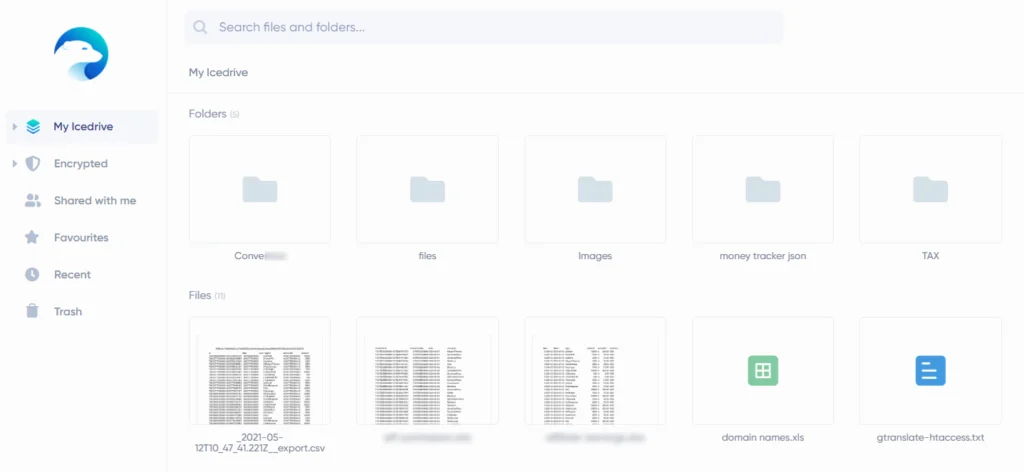

Even for the mobile app version, it works like a charm. It’s as if your files are on your phones – for both IOS and Android.
Drawback #1: No Block-Level Sync
Though this is more of an advanced tech-savvy concern, I still think it’s worth the mention.
Block-Level Sync is basically a cloud feature that allows you to edit only certain parts of a file. So if you have some minor edits to do, you don’t have to change the entire file.
Unfortunately for Icedrive, this option isn’t available.
But if you’re a non-techy user or don’t really mind the upgrades, you can’t really tell the big difference.
Drawback #2: Not for Productivity (Fewer Collaboration Tools)
As mentioned, it’s more suitable for personal cloud storage and not really for heavy productivity or work setting.
The collaboration options are fewer, the file-sharing isn’t as fast, and there are no upload links. As we said earlier – the interface is more integrated-into-your-operating-system type.
Icedrive can be more useful for cold storage too (pun slightly intended).
As much as I love Icedrive for personal or small-scale use, I’d have to be honest and say that if you’re using it for large-scale work and business, pCloud will be the better choice.
Drawback #3: No Chat Support for Troubleshooting
This may not be a basic feature that affects the functionality of Icedrive as a cloud storage per se, but it’s a factor to consider.
What if you encounter some technical problems beyond your control, and you need to retrieve some important files, right? Who will you approach for some cloud storage solution?
Though it’s unlikely to happen (probably why they didn’t find the need to make one), it’d be nicer to have a chat support system, don’t you think?
Pros
Here are some of the benefits that differentiate Icedrive from pCloud.
- No extra payment for client-side encryption
- Icedrive is very generous with features.
- You can set the time of the files you shared
- Security is also good
- Works like a hard drive
- Money-back guarantee
- Compatible with Apple and Windows devices
Cons
Though I personally think Icedrive works well, you may need to consider these too:
- No block-level sync
- Not for productivity or work
- Fewer collaboration tools
- No chat support for troubleshooting
Visit the Icedrive.com website for all the latest deals
… or read my detailed Icedrive.net review here
Get top-tier cloud storage with robust security, generous features, and the user-friendly interface of a hard drive. Discover Icedrive's different plans, tailored for personal use and small groups.
3. Internxt (“Lifetime” cloud storage newcomer in 2024)


Storage: 10GB to 20TB
Free storage: 10GB free cloud storage
Platforms: Windows, macOS, Android, iOS, Linux
Pricing: 2TB ($599 once), 5TB $1,099 (once) or 10TB ($1,599 once)
Quick summary: Internxt is a cloud storage service that offers lifetime plans, using decentralized technology for added security and reliability. With high-speed uploads and downloads and an easy-to-use interface, Internxt is an excellent option for those looking for long-term, secure storage solution.
Website: www.internxt.com
Internxt is a newcomer cloud storage service that offers generous lifetime storage plans.
Internxt is a newcomer cloud storage service that offers generous lifetime storage plans. Although it was founded in 2020, it’s already building a loyal following. The company boasts over a million users worldwide and more than 30 awards and recognitions in the field.
When it comes to collaboration and productivity features, Internxt definitely isn’t the flashiest option on the market. However, what they lack in certain features they make up for with a strong commitment to keeping your data safe.
If you’re looking for a cloud storage provider that takes privacy and security seriously, Internxt is a top competitor.
Internxt use decentralized technology, meaning that files are stored on multiple servers around the world, making it more secure and less vulnerable to hacking or data loss.
Internxt Lifetime Plans Pricing
Internxt lets you choose between monthly, yearly, and lifetime subscriptions.
Since we’re talking about lifetime cloud storage access here, I’ll list the packages under this type of plan.
- 2TB: 2 TB of lifetime access storage is $599
- 5TB: 5 TB of storage is $1,099
- 10TB: 10 TB of storage is $1,599
You can also get 10 GB of storage for free by just simply creating an account! For personal use, this is already a big win. Read more about their plans here.
Internxt Pros and Cons
Pros
- Easy to use, well-designed, and user-friendly interface
- Good customer support
- Reasonably priced plans, especially the 2TB individual plan
- Decentralized technology for added security
- High-speed uploads and downloads
- Easy-to-use interface
- Lifetime plans for a one-time payment of $599
Cons
- Lacking collaboration and productivity features
- Limited to certain file types
- No file versioning
- Limited third-party apps integration
If you’re looking for a secure, long-term cloud storage solution, give Internxt a try. Sign up for a lifetime storage plan today and experience the security and reliability of decentralized technology.
Visit the Internxt.com website for all the latest deals
… or read my detailed Internxt review
Cloud storage with excellent security and privacy features for all your files and photos. Lifetime plans for a one-time payment of $599. Use WSR25 on checkout and get 25% off on all plans.
Other Cloud Storage Services [No Lifetime Deals]
But don’t be disappointed!
If we take lifetime plans out of the equation, there are A LOT of cloud storage options out there that work as well.
The best part is that some of them provide unlimited cloud storage for free!
Sync.com


- Free plan: 5 GB of free storage
- Storage: 5 GB - Unlimited
- Current deal: Get 2TB secure cloud storage from $8/mo
- Website: www.sync.com
This could easily be part of our top 2 best cloud storage providers on our list, if not for the lack of lifetime subscription.
But if you’re looking for a cloud service that’s perfect for accounting, legal, and healthcare businesses, go for Sync.com.
When we speak of security, I’m willing to put my full trust in Sync.com because (if I may use the word) they’re the more ethical choice.
More than the fancy interface, they’re all about protecting you – making it safe for legal privacy practices.
Here are their affordable and user-friendly pricing packages (note that all of them allow unlimited shares and transfer):
- Business Pro Teams Standard: 1TB of storage per user for 2-100 users at $8/month (when paid annually)
- Business Pro Teams Plus: 4TB of storage per user for 2-100 users at $6/month (when paid yearly)
- Business Pro Teams Advanced: 10TB of storage per user for 2-100o users at $15/month (when paid annually)
- Free: You’ll also get 5GB free space upon signing up!
Pros
Here’s a quick rundown of the benefits you’ll get from Sync.com:
- 100% HIPAA compliant
- You’re in control – access expiry, sharing permission, etc.
- Automatic syncing
- 24/7 in-house support and customer service
- Doesn’t allow third-party integrations (safe)
- Files are password protected
- Read my Sync.com review
Cons
- Doesn’t allow third-party integrations (not as accessible for sharing)
- No lifetime subscription (too bad, really!)
IDrive Cloud Backup and Storage Solutions
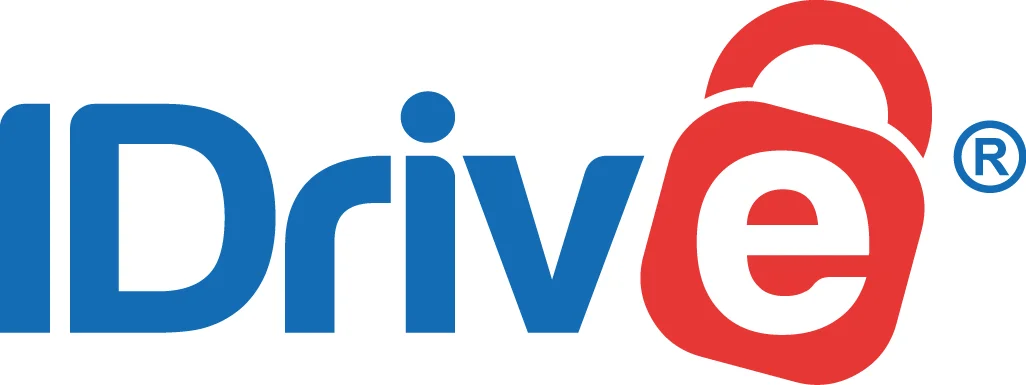

- Free plan: 10 GB of free storage
- Storage: 10 GB - 50 TB
- Current deal: Get 5TB of cloud backup for $7.95 (50% off)
- Website: www.idrive.com
IDrive provides a plan with 5GB of free cloud storage. No catch or anything; it’s just really for you to experience their cloud services before you decide to upgrade!
But take note that IDrive is backup and not really cloud storage. There’s a fine line between these two.
Basically, IDrive is a place for you to store your backups, but it’s not your actual and main storage. Whether that’s a pro or a con now depends on you and your needs.
Pros
Here’s a quick rundown of the benefits you’ll get from IDrive:
- Affordable (price increases as you go)
- Conveniently compatible for all devices (Windows PC, Mac desktop app, mobile app, tablet, etc.)
- Automatic cloud backup
- Remote management
- Business plan, personal plan, and team plan are all available
- Secure with the 256 bit AES encryption
- Read my IDrive review
Cons
- Not exactly cloud storage (if that’s what you’re looking for)
- Slow download/upload
- No monthly and lifetime plan (only yearly)
- No unlimited backups
Dropbox


- Free plan: 2 GB of free storage
- Storage: 2 GB - 3 TB
- Current deal: Get 2TB cloud storage from just $9.99/mo
- Website: www.dropbox.com
You’re probably familiar with DropBox since it used to be one of the most known cloud storage providers.
Such as when your file is too big, emails would usually suggest using Dropbox to deliver them. That’s one of the beauties of cloud storage!
If you don’t really need an elaborate cloud storage provider, Dropbox is actually a good cloud storage solution, especially for syncing folders and if you just need the speed.
Pros
Here’s a quick rundown of the benefits you’ll get from Dropbox:
- Trusted and long-standing in the market
- A lot of collaboration options (email, Canvas, Slack, etc.) means easier file sharing
- Affordable for 16TB of storage
- Offers a free plan with 2GB of free space
Cons
- Not the most secure for storage (no advanced encryptions, two-factor authentication, or anything like that)
- Only for short-term and personal use
- No lifetime permanent cloud storage
- Find out what the best Dropbox alternatives are here
Google Drive


- Free plan: 15 GB of free storage
- Storage: 15 GB - 30 TB
- Current deal: Get 100 GB storage from $1.99 per month
- Website: drive.google.com
As long as you have Google emails (GMails), you’ve surely used Google Drive (GDrive) for file sharing and storage at least once.
Since almost everyone has a Gmail by now, it’s also the most accessible cloud storage space that’s user-friendly and easy to share.
But accessibility has a disadvantage too, which is the lack of privacy.
You may recognize the basic Google Drive more with its free storage, but it also has Workspace, which is already paid for and is similar to other business plans.
Pros
Here’s a quick rundown of the benefits you’ll get from Google Drive:
- Accessible – almost everyone uses or is familiar with GDrive
- Comes with a free plan with 15GB of free storage and no restrictions
- Easy to use and user-friendly
- Works on any PC device and mobile apps alike
- Google ecosystem
Cons
- Not the most secure in terms of files (no passwords, authentication, encryptions)
- Not the most secure in terms of personal information and data
- Find out what the best Google Drive alternatives are
Microsoft OneDrive


- Free plan: 5 GB of free storage
- Storage: 100 GB - Unlimited
- Current deal: Get 100 GB storage from $1.99 per month
- Website: onedrive.live.com
OneDrive, also known as Apple’s iCloud counterpart, is best for Windows and PC users. It’s affordable and allows you to upgrade from an individual to a family and business plan.
One similarity OneDrive has with other plans on the list is also comes with a free plan with 5GB free storage space.
Pros
Here’s a quick rundown of the benefits you’ll get from OneDrive:
- Linked with Windows operating system and Microsoft
- They offer different business plans: Business 1, Business 2, 365 Business Basic, 365 Standard.
- Business 1: 1TB of storage space for $5 monthly (paid yearly)
- Business 2: Unlimited cloud storage space with security for $10 monthly (paid yearly)
- 365 Business Basic: 1TB of storage space with Microsoft Office Essentials apps for $6 monthly
- 365 Standard: 1TB of storage space with all Microsoft Office apps and tools for $15 monthly
Cons
- No zero-knowledge encryption
- Not the most secure
- Find out what the best Microsoft OneDrive alternatives are
iCloud
This is the most convenient option for Apple users, especially if you’re already within the Apple ecosystem.
You can easily access your files across different Apple devices as long as you’re logged in to the same Apple ID. It also comes with family plans good for 6 users per household.
Even if you haven’t availed of the actual plan, you’ll already have access to 5GB of free storage on your Apple device.
Pros
Here’s a quick rundown of the benefits you’ll get:
- Multiple cloud storage options (50GB, 200GB, and 2TB)
- Very convenient for Apple devices
- Can also be used as a cloud backup
- Secure enough
Cons
- Limited to Apple devices and users only
- Limited features, see what the best iCloud alternatives are
Cloud Storage Glossary
Whether you’re a beginner just starting out with cloud storage, or someone looking to brush up on their knowledge, this glossary is your go-to resource for clear and concise definitions.
- End-to-End Encryption: A method of secure communication that prevents third-parties from accessing data while it’s transferred from one end system to another.
- Example: When you send a message on Signal, it is encrypted on your device and only decrypted on the recipient’s device, preventing others, including Signal, from viewing its contents.
- Zero-Knowledge: A security model where the service provider has no knowledge of the data you’re storing on their servers.
- Example: When using a zero-knowledge cloud storage service like SpiderOak, even the service providers cannot access or decrypt your data; only you have the key to do so.
- GB (Gigabyte): A unit of digital information storage equal to approximately one billion bytes. Commonly used to measure storage capacity.
- Example: A smartphone might have an internal storage capacity of 64 GB, capable of holding thousands of photos, songs, or several hours of video.
- TB (Terabyte): A unit of digital storage that is approximately one trillion bytes, or 1,000 gigabytes. Often used for measuring large storage capacities.
- Example: An external hard drive with 1 TB of storage can hold around 250,000 songs, 200,000 photos, or about 500 hours of HD video.
- File Sharing: The process of giving other users access to digital files or folders.
- Example: Sharing a folder through Google Drive with your team members so they can view and edit the documents inside.
- File Syncing (Synchronization): Automatically updating files across multiple devices to ensure consistency.
- Example: Editing a report on your laptop and having those changes automatically reflected in the same file on your tablet via Dropbox.
- Data Backup: Creating a copy of data to be restored in case the original data is lost or corrupted.
- Example: Using Apple’s Time Machine to regularly backup your entire Mac, so you can restore your system to a previous state if needed.
- File Versioning: Keeping multiple versions of a document, allowing users to view or restore older versions.
- Example: Microsoft OneDrive saving each version of a document as you make changes, enabling you to revert to an earlier version if necessary.
- 2FA (Two-Factor Authentication): An additional security process requiring two different authentication methods to verify the user’s identity.
- Example: Accessing your online banking account, where you enter your password (first factor) and then a code sent to your phone (second factor).
- AES Encryption (Advanced Encryption Standard): A widely used algorithm for securing electronic data. It encrypts data in fixed blocks.
- Example: When you store files in a cloud service like Tresorit, it uses AES encryption to secure your files, making them unreadable to anyone without the decryption key.
- TwoFish Encryption: A symmetric key block cipher known for its speed and suitability for both hardware and software implementations. It’s a flexible encryption method.
- Example: A file encryption program offering TwoFish as an option to encrypt your personal files before uploading them to a cloud server.
- GDPR Compliance (General Data Protection Regulation): Refers to adhering to a set of regulations designed to protect personal data and privacy in the European Union and European Economic Area.
- Example: A cloud storage service like Box updating its policies and security measures to ensure GDPR compliance, safeguarding the personal data of its EU customers.
- Link Sharing: The process of creating a link that allows others to view or download a file or folder from your cloud storage.
- Example: Generating a shareable link in Dropbox for a video file, which you then send to a friend, allowing them to download the video directly.
- File History and Recovery: A feature in many cloud storage services that keeps a record of file versions and changes, allowing users to recover older versions or deleted files.
- Example: Google Drive maintaining a history of all changes made to a document for 30 days, giving you the option to restore an earlier version if needed.
Verdict ⭐
These are the best options for lifetime cloud storage. I get that having only two choices might feel a bit underwhelming, but from my experience, pCloud and Icedrive are the real deal. They offer solid, reliable service without the worry of ongoing fees. You can count on them to keep your data safe for the long haul.
✨ Best Overall: pCloud
Bagging two of our awards, this is the one for your business and productivity’s file storage needs. It takes pride in its fast and feature-filled cloud storage with advanced encryption for good network drives.
The only drawback is the expensive price tag and the additional charge for encryption. But if you look at it as a business investment for lifetime storage, I’d say it’s worth it.
✨ Best Runner up: Icedrive
Coming in as a close second, Icedrive can also provide you with the security and privacy you need without charging extra. It’s a lot cheaper than pCloud, but still gives the services that you’d expect from a cloud storage company.
A bonus pro worth mentioning is the free plan of 10TB of storage upon the creation of an account. You just won’t have the client-side encryption, but for a free plan? 10TB is already an EXCELLENT bargain.
The biggest drawback it has that tipped the scale towards pCloud is the productivity aspect. pCloud outperforms Icedrive in terms of productivity by a lot.
TL;DR
So to sum it all up, here are the premier cloud storage providers.
- pCloud (Best Overall and Best Value. Known for its robust features, including a dedicated music player and zero-knowledge encryption. Offers lifetime plans that are a great investment for long-term users. Learn more here)
- Icedrive (Best Budget Option. Offers excellent privacy and security features at a lower cost, with a user-friendly interface and lifetime subscription options. Learn more here)
- Sync.com (Best Overall for Non-Lifetime Plans. Offers strong security features and competitive pricing for annual plans)
Next up are our runner-ups. They perform well and have affordable pricing for what they are. They just don’t have lifetime cloud storage plans.
- iDrive (Best for Cloud Backup. Offers comprehensive backup solutions with competitive pricing)
- Dropbox (Best Well-Known Cloud Storage Service. Known for its reliability and extensive third-party integrations)
- Google Drive (Most Accessible Cloud Storage. Offers seamless integration with Google Workspace and generous free storage)
- OneDrive (Best for Windows Users. Provides excellent integration with Microsoft Office and Windows OS, making it ideal for those in the Microsoft ecosystem)
How We Review Cloud Storage: Our Methodology
Choosing the right cloud storage isn’t just about following trends; it’s about finding what genuinely works for you. Here’s our hands-on, no-nonsense methodology for reviewing cloud storage services:
Signing Up Ourselves
- First-Hand Experience: We create our own accounts, going through the same process you would to understand each service’s setup and beginner friendliness.
Performance Testing: The Nitty-Gritty
- Upload/Download Speeds: We test these in various conditions to evaluate real-world performance.
- File Sharing Speeds: We assess how quickly and efficiently each service shares files between users, an often overlooked but crucial aspect.
- Handling Different File Types: We upload and download diverse file types and sizes to gauge service versatility.
Customer Support: Real-World Interaction
- Testing Response and Effectiveness: We engage with customer support, posing real issues to evaluate their problem-solving capabilities, and the time it takes to get a reply.
Security: Delving Deeper
- Encryption and Data Protection: We examine their use of encryption, focusing on client-side options for enhanced security.
- Privacy Policies: Our analysis includes reviewing their privacy practices, especially regarding data logging.
- Data Recovery Options: We test how effective their recovery features are in the event of data loss.
Cost Analysis: Value for Money
- Pricing Structure: We compare the cost against the features offered, evaluating both monthly and annual plans.
- Lifetime Cloud Storage Deals: We specifically look for and assess the value of lifetime storage options, a significant factor for long-term planning.
- Evaluating Free Storage: We explore the viability and limitations of free storage offerings, understanding their role in the overall value proposition.
Feature Deep-Dive: Uncovering Extras
- Unique Features: We look for features that set each service apart, focusing on functionality and user benefits.
- Compatibility and Integration: How well does the service integrate with different platforms and ecosystems?
- Exploring Free Storage Options: We evaluate the quality and limitations of their free storage offerings.
User Experience: Practical Usability
- Interface and Navigation: We delve into how intuitive and user-friendly their interfaces are.
- Device Accessibility: We test on various devices to assess accessibility and functionality.
Learn more about our review methodology here.
References:

